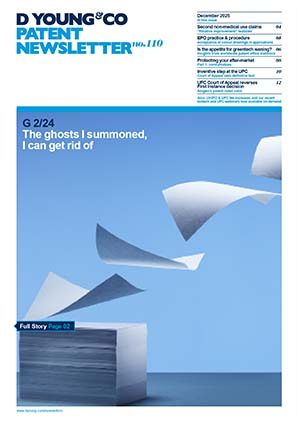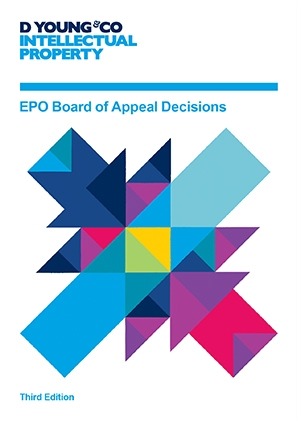G2/21: Enlarged Board of Appeal issues a communication ahead of appeal proceedings
In 2021 we reported on the referral of three questions to the Enlarged Board of Appeal (EBA), in G2/21. These questions related to the question of whether post-published data (data that was not available until after the filing date of a patent application) can be relied upon to demonstrate an inventive step. The Enlarged Board of Appeal has now issued a brief communication (on 13 October 2022) highlighting issues that the board considers to be of potential significance.
G2/21: Enlarged Board of Appeal issues its decision
The much awaited decision of the Enlarged Board of Appeal concerning whether post-filing data can be used in support of a technical effect for inventive step issued 24 March 2023.
Read moreThe three questions referred to the Enlarged Board of Appeal were:
- Should an exception to the principle of free evaluation of evidence (see e.g. G 3/97, Reasons 5, and G 1/12, Reasons 31) be accepted, in that post-published evidence must be disregarded on the ground that the proof of the effect rests exclusively on the post-published evidence?
- If the answer is yes (the post-published evidence must be disregarded if the proof of the effect rests exclusively on this evidence), can the post-published evidence be taken into consideration if, based on the information in the patent application in suit or the common general knowledge, the skilled person at the filing date of the patent application in suit would have considered the effect plausible (ab initio plausibility)?
- If the answer to the first question is yes (the post-published evidence must be disregarded if the proof of the effect rests exclusively on this evidence), can the post-published evidence be taken into consideration if, based on the information in the patent application in suit or the common general knowledge, the skilled person at the filing date of the patent application in suit would have seen no reason to consider the effect implausible (ab initio implausibility)?”
Admissibility and scope
The Enlarged Board of Appeal noted that the referral appears to be admissible, and also commented on the scope of their considerations. In particular, while the issue of whether post-published evidence can be considered is arguably relevant to both sufficiency and inventive step, the Enlarged Board of Appeal noted that the referring Board of Appeal had already explicitly acknowledged that the invention was sufficiently disclosed in the patent in question. The Enlarged Board of Appeal, therefore, considered it inappropriate to extend the scope of the referral beyond the issue of using post-published data for demonstrating a technical effect in respect of assessing inventive step.
Question 1
Question 1 refers to a principle known as the principle of free evaluation of evidence.
According to previous Enlarged Board of Appeal decisions G3/97, G4/97 and G1/12 “(t)he principle of free evaluation [of evidence] would be contradicted by laying down firm rules of evidence defining the extent to which certain types of evidence were, or were not, convincing”.
In the present referral question 1 highlights that imposing rules on when post-published evidence can or cannot be considered would appear to go against the principal of free evaluation of evidence. Hence, question 1 asks whether an exception to this principal should be accepted in situations where proof of a technical effect rests solely on post-published evidence.
The Enlarged Board of Appeal commented on this question by stating that: “[d]isregarding such evidence as a matter of principle would deprive the party submitting and relying on such evidence of a basic legal procedural right generally recognised in the contracting states and enshrined in Articles 113(1) and 117(1) EPC.”
Hence, from this statement, it appears that the Enlarged Board of Appeal considers that there must be at least some situations in which post-published evidence can be considered when assessing inventive step. However, from the Enlarged Board of Appeal’s considerations of questions 2 and 3 (see below), it would appear that the it is leaning towards an answer of “yes” to the first question (that an exception to this principal should, in at least some situations, be granted in respect of using post-published evidence to demonstrate a technical effect).
Questions 2 and 3
With respect to the specific requirements for when post-published should or should not be relied upon for assessing inventive step the Enlarged Board of Appeal acknowledges that more explicit guidance is required.
In consideration of questions 2 and 3, the Enlarged Board of Appeal suggests that whether or not post-published evidence can be used depends on “whether the skilled person, having the common general knowledge at hand, would have any significant reason to doubt” the purported technical effect, based on the application documents as filed: “It is then on the basis of the application documents and this technical teaching that a purported technical effect relied upon for inventive step is to be assessed as to whether the skilled person, having the common general knowledge in mind, would have significant reason to doubt it.”
In particular, the Enlarged Board of Appeal suggests that in absence of such doubts, the use of post-published data to establish whether the technical effect is convincing would seem appropriate: “In the absence of any doubts, the reliance on post-published evidence, such as experimental data, for the purported technical effect would seem to serve as a potential source for a deciding body to conclude whether or not it is convinced of said technical effect when deciding on the inventiveness of the claimed subject-matter.”
In contrast, the Enlarged Board of Appeal notes that if the skilled person would have significant reason to doubt the purported technical effect it would appear “questionable” whether it would be appropriate to rely upon post-published data: “However, whether such evidence could also be successfully relied upon in the event that the skilled person, on the basis of the application as originally filed together with the common general knowledge, had significant doubts in respect of the purported technical effect, appears questionable.”
Conclusion
From this communication, it would appear that the Enlarged Board of Appeal is leaning towards applying the “ab initio implausibility” standard: where post-published evidence can only be disregarded if the skilled person would have significant reason to doubt the purported technical effect based on the application documents as filed.
However, we will need to wait until after the hearing (scheduled for 24 November 2022) to see the final decision of the Enlarged Board of Appeal (noting that the Enlarged Board of Appeal is not bound by any opinions expressed in the most recent communication).

